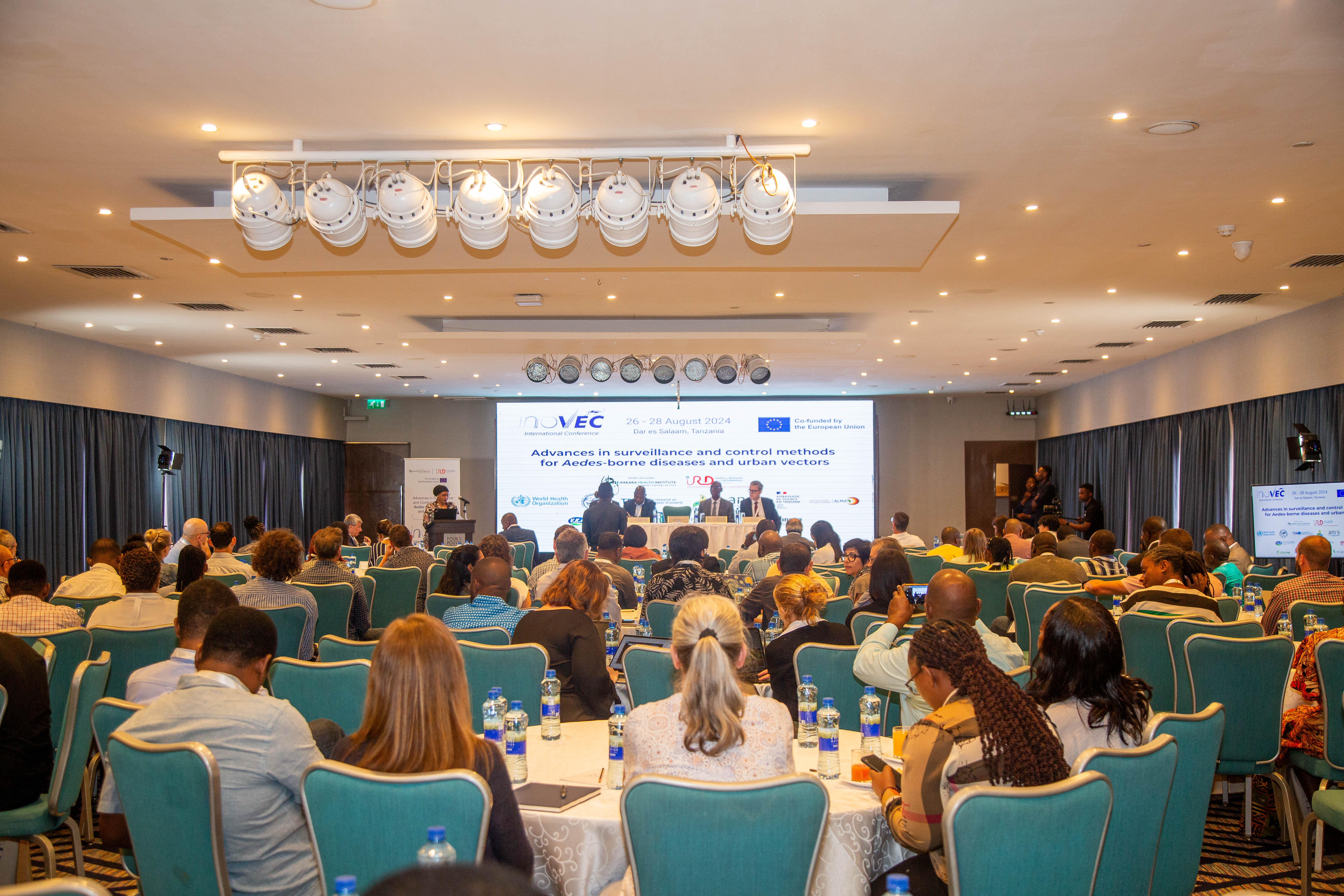
INOVEC CONFERENCE: Global gathering to combat Aedes-Borne diseases held in Dar

From 26-28 2024, the inaugural joint international conference on “Advances in Surveillance and Control Methods for Aedes-Borne Diseases and Urban Vectors” took place at the Four Points by Sheraton in Dar es Salaam, Tanzania.
Organized by the Ifakara Health Institute and the Institut de Recherche pour le Développement (IRD), and supported by the European INOVEC project, this three-day conference provided a vital platform for the exchange of ideas and the fostering of collaboration among global experts.
"Aedes-borne" refers to diseases transmitted by mosquitoes of the Aedes genus, which are known to spread viruses that cause illnesses such as dengue fever, Zika virus, chikungunya, and yellow fever. These mosquitoes are common in tropical and subtropical regions and are distinct for their daytime biting behavior.
The conference gathered a diverse group of participants, including researchers, students, academia, public health professionals, stakeholders, donor agencies, industry representatives, and international organizations. These attendees share a common mission: to combat vector-borne diseases (VBDs) that continue to pose a significant threat to public health worldwide.
Structured around three key themes—Biology and Ecology of Aedes Vectors, Integrated Approaches to Vector Control, and Innovation in Vector Control—the conference aimed to achieve several objectives: facilitating knowledge exchange, promoting collaborative research and innovation, reviewing new tools and technologies for Aedes mosquito control, and advocating for actionable outcomes to improve public health measures against mosquito-borne diseases.
The conference began with a warm welcome from several key figures, including Dr. Honorati Masanja, Chief Executive Director of Ifakara Health Institute, Ziada J. Sellah, representative of the Tanzania Ministry of Health, and Luc Blanco, Cooperation and Cultural Action Advisor at the French Embassy in Tanzania. Emmanuel Kaindoa of Ifakara, chaired the opening session, setting the stage for a series of insightful discussions.
Among the keynote speakers, Raman Velayudhan from the World Health Institute, gave context on the “Global dengue situation and the global arbovirus initiative,” highlighting the pressing need for coordinated global efforts. Vincent Corbel of IRD - Institut de Recherche pour le Développement/Fiocruz, Brazil, provided insights into the INOVEC project, a partnership dedicated to enhancing the surveillance and control of mosquito vectors of emerging arboviruses.
Day 1: Advancing Knowledge in Vector Biology and Ecology
Day 1 of the conference highlighted key scientific sessions and presentations. The day began with an in-depth exploration of the Biology and Ecology of Aedes Vectors, followed by a detailed session on the Biology and Ecology of Invasive Vectors. Attendees engaged in Turbo Talks, which featured brief, impactful presentations with an opportunity for questions. Doctoral students also presented their research in dedicated sessions, allowing for a 10-minute talk followed by a 5-minute Q&A segment. This structured approach facilitated a comprehensive discussion of the latest developments and research in vector biology and ecology.
Day 2: Innovative Strategies and Collaboration in Vector Control
The Second Day of the INOVEC International Conference featured groundbreaking research and innovative strategies against vector-borne diseases. The "Integrated Approaches to Vector Control" session, emphasized community engagement and advanced technology.
Topics included public involvement in controlling invasive species, a web-based tool for urban malaria surveillance, and novel methods for monitoring arbovirus exposure. Practical tools like mosquito traps were also discussed.
The Day also hosted an industry session on "Developing Public-Private Partnerships for Success," highlighting the importance of collaboration between researchers, industry, and public health professionals to develop effective vector control tools.
Later on, there will be an ethnicity night dinner gala, offering an opportunity for cultural exchange, networking, and discussing future collaborations to advance vector control efforts
DAY 3: Innovations in vector control
Last day of the conference focused on innovative strategies in vector control. Discussions included the need for improved methods and data in mosquito surveillance and control, as well as findings from a trial evaluating integrated vector management's effectiveness in reducing dengue incidence in urban Malaysia.
Presentations covered the autodissemination of pyriproxyfen for malaria vector control in Africa, the use of hessian fabric transfluthrin vapour emanators for Aedes mosquito protection in Tanzania and Haiti, and a novel malaria transmission-blocking strategy using Microsporidia MB. Additionally, bioinsecticides based on interfering RNA were explored as a potential tool for controlling Aedes mosquitoes.
Awards were given to the best doctoral student presentations held on the first day. Among the winners were Temesgen Ashine from Ethiopia, Frank Tenywa from Tanzania, and Borel Tchamen Djiappi from Cameroon. The student presentations concluded with remarks from Dr. Abraham Mnzava, the Chairperson of Ifakara's Board of Trustees.
With a strong focus on cultivating collaboration, critically reviewing existing evidence, establishing new networks, and mobilizing resources, this conference is poised to drive forward both fundamental and translational research efforts. The ultimate goal is to mitigate the global burden of vector-borne diseases, safeguarding health and well-being in communities around the world.
Stay tuned as we continue to bring you updates and insights from this groundbreaking event throughout the day.
